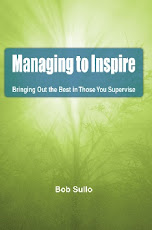While staff development budgets have been slashed in recent
years, millions of dollars are still spent on workshops designed to improve
teaching and learning. Despite the money spent, things aren’t significantly
better in most schools. Sure, there are notable exceptions, but too many
schools continue to tread water.
An issue like staff development clearly involves lots of
variables. No single factor explains why too many schools aren’t getting a
reasonable return on the money they invest. As someone who provides staff
development, I have noticed a couple of things that I believe contribute to the
problem. Since many of you who read this are instrumental in bringing staff
development sessions to your school/district, I’ve decided to share a few
thoughts.
One problem is what I call “drive by staff development.”
Sadly, this is fairly typical. A consultant is brought in to work with a school
or district for a day. Typically, things go well, people are engaged, the
consultant gets positive reviews, and ….nothing changes.
I have this experience frequently. I make some money. The staff
and I share a pleasant day together. But nothing really changes. I have this
reoccurring waking nightmare. It’s several months after one of my sessions and
a bunch of teachers I worked with are in the staff lounge at their school.
Someone says, “Hey, remember that guy Bob who presented for us? I don’t
remember what he said exactly, but he was OK.” Unfortunately, my waking
nightmare is probably someone else’s reality!
These “one offs,” as my friends in Australia and New Zealand
call them, are not the most effective way to spend scarce dollars. Teachers
need (and deserve) follow-up if they hope to move from the awareness level to
the application level. And skilled application requires ongoing coaching and
support. Unfortunately, most schools erroneously believe they are ready to rock
and roll once they have “done it.” (As in, “Internal control psychology. Yeah,
we did that last year. Somebody came for a day before school started.”)
My worst experience with this happened many years ago. I was
contacted by a district interested in a session for their entire staff. “What
would you like me to focus on?” I asked. “Oh, it doesn’t really matter. We have
some grant money we need to spend. Do whatever you usually do, I guess.” I took
the job and was grateful for the money. But the only thing I got from that
experience was pay. I didn’t have a sense that I was engaged in meaningful
work.
Compare that to this:
I was recently contacted by someone interested in having me provide
training to a group of teachers working across a number of districts. The
person coordinating the training approached me with a plan that was well
thought out and will give participants the chance to internalize and apply the
content I will share. After an initial two-day training, we are planning a
series of short, ongoing follow-up sessions. Because cost is always an
important consideration and this group is quite a distance from where I live,
the follow-up sessions may be conducted using Skype or something similar. While
I’m not usually a fan of distance learning, I’m comfortable with it if I’ve
already had a chance to spend a couple of days with participants engaged in
face-to-face learning and interaction. Because this will save the districts
considerable money, it’s an accommodation I am comfortable making. At the
conclusion of the school year, I’m confident the participants will have gained
knowledge and skills that will enhance their professional lives and lead to
increased student achievement and improved student behavior.
A thoughtfully considered, comprehensive approach to staff
development is one way to ensure that limited funds are utilized wisely. To
those of you who help bring staff development to your school or district,
please avoid most “drive by” experiences and put together a comprehensive
experience that supports deep learning, application, and student achievement.
***
As always, if you enjoyed this and found it useful, please
send the link to your friends. Thanks.
Bob Sullo
PO Box 1336
Sandwich, MA 02563
For information about books by Bob Sullo and to schedule a
keynote, workshop, or series for your school, agency, or parent group visit
www.internalmotivation.net






Thanks, Bob. I agree training must be ongoing, and follow up is essential for reinforcing a collaborative learning cycle of Planning, Teaching, and Revising. However, there is also a good amount of professional development not deserving of being being called back for a second visit.
ReplyDeleteAt the very beginning of the process, schools need help selecting professional development that will produce results, and is therefore worthy of follow through.